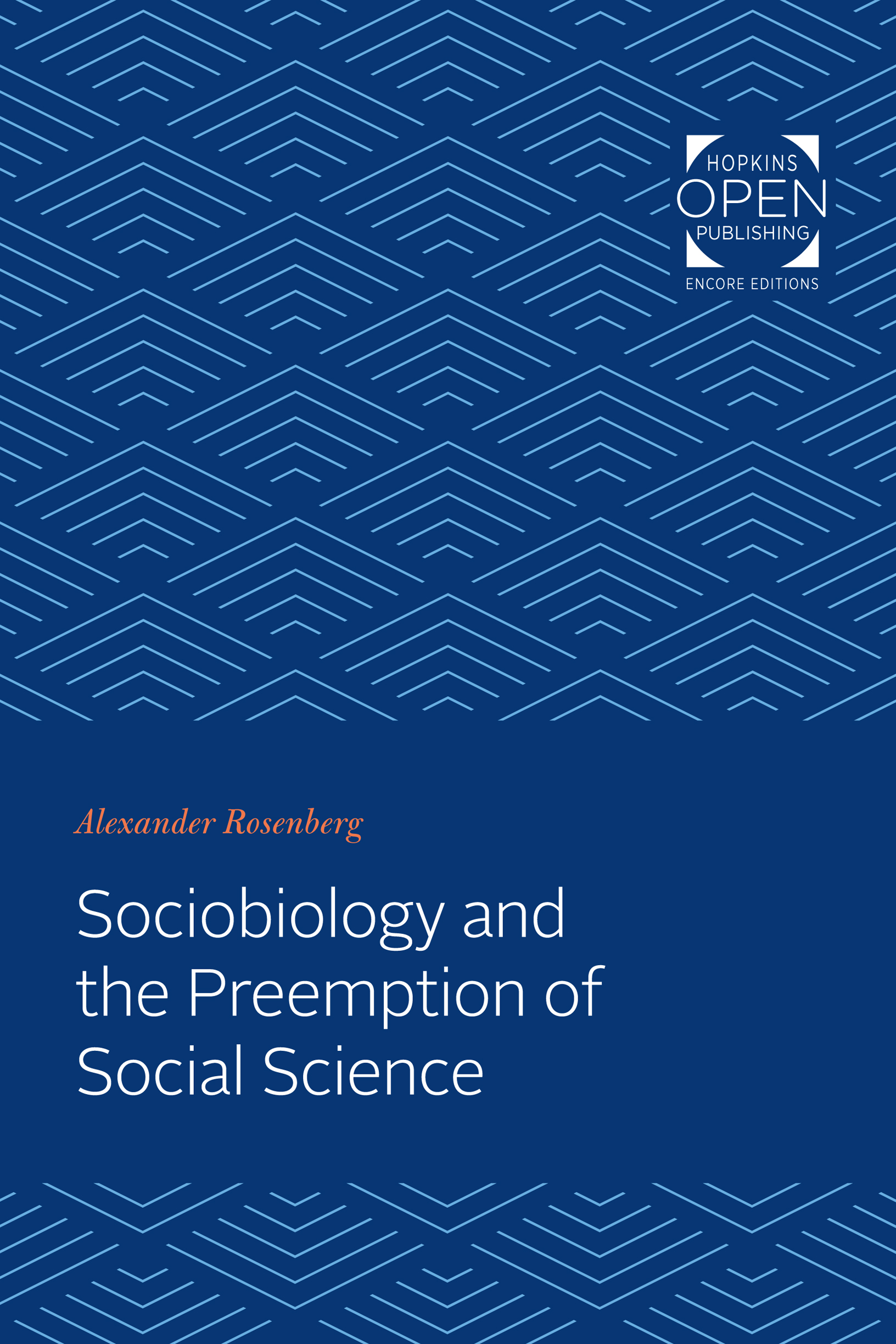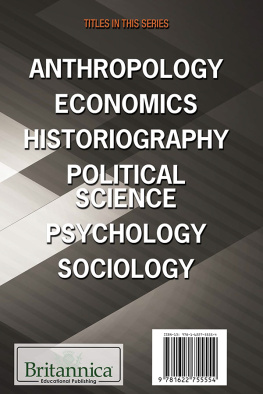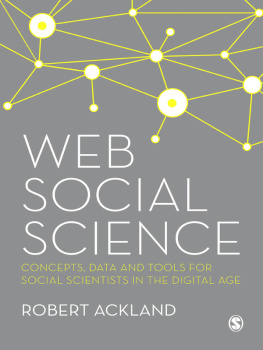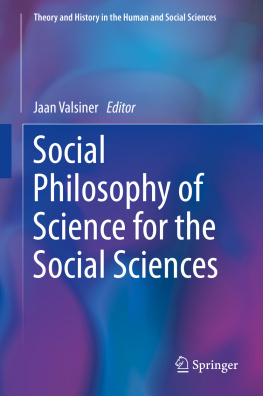Contents
Guide
Pagebreaks of the print version

Open access edition supported by the National Endowment for the Humanities / Andrew W. Mellon Foundation Humanities Open Book Program.
2019 Johns Hopkins University Press
Published 2019
Johns Hopkins University Press
2715 North Charles Street
Baltimore, Maryland 21218-4363
www.press.jhu.edu
The text of this book is licensed under a Creative Commons Attribution-NonCommercial-NoDerivatives 4.0 International License: https://creativecommons.org/licenses/by-nc-nd/4.0/.
CC BY-NC-ND

ISBN-13: 978-1-4214-3544-2 (open access)
ISBN-10: 1-4214-3544-6 (open access)
ISBN-13: 978-1-4214-3542-8 (pbk. : alk. paper)
ISBN-10: 1-4214-3542-X (pbk. : alk. paper)
ISBN-13: 978-1-4214-3543-5 (electronic)
ISBN-10: 1-4214-3543-8 (electronic)
This page supersedes the copyright page included in the original publication of this work.
Sociobiology and the Preemption of Social Science
SOCIOBIOLOGY AND THE PREEMPTION OF SOCIAL SCIENCE
Alexander Rosenberg
THE JOHNS HOPKINS UNIVERSITY PRESS
Baltimore and London
This book has been brought to publication with the generous assistance of the Andrew W. Mellon Foundation.
Copyright 1980 by The Johns Hopkins University Press
All rights reserved
Printed in the United States of America
The Johns Hopkins University Press, Baltimore, Maryland 21218
The Johns Hopkins Press Ltd., London
Library of Congress Cataloging in Publication Data
Rosenberg, Alexander, 1946
Sociobiology and the preemption of social science.
Bibliography: pp. 219-21
Includes index.
1. Sociobiology. 2. Social sciences-Philosophy.
I. Title.
GN365.9.R66 306.4 80-8091
ISBN 0-8018-2423-0
For S. T. Rosenberg and Blanca N. Rosenberg
Because of their wisdom and in spite of their demurral
Contents
Preface
In the preface to a previous book, Microeconomic Laws: A Philosophical Analysis, I claimed that much important work in the philosophy of science is independent of grander issues in epistemology, and that the views defended in that book could neither be accepted nor rejected on the strength of alternative answers to fundamental questions in philosophy. This is a belief of which I have repented, and the present work is a reflection of that substantial change. While I still believe that findings about the actual practice of scientists can decide no fundamental metaphysical or epistemological issues, I now hold that the sides one takes on these issues must decisively determine the character of strategies of research in the natural and social sciences. The present essay offers a novel account of the implications of a commitment to empiricism for the research programs of the social sciences. It does so by pursuing an inductive argument to the best explanation of why the social sciences have failed to attain the degree and the kind of success in explanation and prediction that the natural sciences have attained, in spite of the employment of broadly similar empirical methods. The argument rests on the assumption that the methods in question, which reflect empiricist presuppositions, are as appropriate to the study of human behavior as to the study of any other natural phenomena, and therefore seeks the causes of failure in social science beyond alleged errors in method. This is the respect in which broad epistemological commitments shape narrower methodological decisions, and substantive contingent beliefs. For it is in such empirical beliefs that the mistakes and the failures of social science are to be found and explained. Or so this book shall argue. But its aims are not limited to the identification of false beliefs and the explanation of their firm grip on social scientists. For the diagnosis provides a prognosis, a prescription for improvement in these disciplines, which suggests that closer attention to methods and concepts drawn from the natural sciences, especially biology, will lead to successes where conventional social science has hitherto failed. The premises of my explanation of the failures of the social sciences are at the same time premises in an argument that they be replaced, superseded, preempted, by sociobiology.
So substantial a change of view as this work represents must be the product of very strong influences. Indeed, while no one hereafter acknowledged can be held to be responsible for or even in agreement with any of the claims broached, there are many persons with a very substantial causal role in the reformation of my thinking. Fortunately for them, causal agency does not entail moral or intellectual responsibility for my radical conclusions. Earliest among the forces working to effect changes in my view were David Bray-brookes persistent criticisms of my complacent treatment of economic theory. If my latest views are no more satisfactory to him than the earlier ones, I nevertheless owe him a great debt. I am equally indebted to my wife, Merle Kurzrock, whose equally persistent questions led me to first formulate the view about human behavior here defended, and led me to see its relevance for all the social sciences. As a biologist she also provided a spur and a resource for my thinking about the conceptual situation of biology. This is a subject unjustly neglected by the empiricist program in the philosophy of science, and one which, I was surprised to discover, is far more important to our understanding of social science than abstract prescriptions from the philosophy of physics. This book reflects that discovery, one I might not have made without my wifes influence.
For detailed comments and criticisms of material that eventuated in this works account of social science, I am heavily indebted to Jonathan Bennett, Richmond Campbell, Eric Von Magnus, and Alan Donagan. For helpful discussion of varying aspects of the issues here examined I owe thanks to Robert M. Martin, Daniel Hausman, Donald Davidson, Robert Cummins, Steven Strasnick, Laurence Davis, Alex Michalos, Alasdair MacIntyre, Joseph Pitt, Joseph Margolis, Jules Coleman, Ned McClennen, Stewart Thau, and Peter van Inwagen. Much of my thinking about biological theory which informs the later chapters of this book reflects the influence of Jaegwon Kim and invaluable discussions with David Hull, Michael Ruse, Mary Williams, Richard Burian, and William Wimsatt. For helping me to see how my apparently independent interests in the social sciences and in biology come inevitably together I must thank Thomas Lawson, Joan Straumanis, Phillip Scribner, Rada Dyson-Hudson, Werner Honig, Antony Kenny, Rom Harre, and Thomas Simon. For helpful comments on the exposition and assessment of their views I am also indebted to Gary Becker and E. O. Wilson. Although he is not cited in the pages below, Gilles-Gaston Grangers influence on my thoughts about the nature of science has been especially strong in this work. For reading and commenting on drafts of the entire manuscript I owe thanks to Robert J. Wolfson, Marshall Segall, David Hull, Michael Ruse, and especially Joel Kidder, who preserved me from infelicities and errors in every chapter. The large number of those that remain are but a mark of the still larger numbers from which he, and others, have preserved the reader. I must also thank Nita Esterline, Betsy Queen, and Val Cardoza for exceptional efficiency and thoroughness in transforming my original typescript into syntactically and orthographically readable copy. For further improvements in readability I am indebted to Carolyn Moser and Mary Lou Kenney. If this work is not yet readable, the author has only himself to blame.






